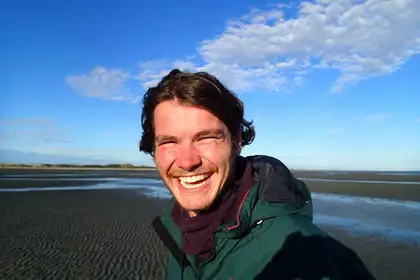
Bachelor of Communication student Harry Townsend, part of The Anthropozine editorial team.
Fostering a love for nature among a generation more focused on digital screens than wilderness scenes is the aim of an online publication just launched by a team of Massey students. They hope to cut through the inertia and fear that overwhelmingly negative news about climate change can trigger.
Spokesman and content curator Harry Townsend, a third year Bachelor of Communication student, says the idea behind the The Anthropozine is a “digital campfire” to reconnect people with a love and appreciation of nature’s beauty. This, he believes, is a necessary precursor to unleashing a deeper sense of concern for the damage being done to the natural world – ultimately to motivate action.
“Our mission is to inspire readers to work towards healing humankind’s broken relationship with Earth, by providing a space to explore solutions and climate action through community-sourced storytelling,” Mr Townsend says.
The publication offers a diverse array of art, photography, poetry, essays and advocacy on a broad range of environmental topics. It also features podcasts, such as one featuring Wellington-based storyteller and educator Peregrin Hyde in discussion with Tony Huang, co-convener of School’s Strike for Climate New Zealand; Nikau Te Huki, an artist, activist, and the frontman of Wellington Band H4lf Cāst; Dr Sea Rotmann, a marine biologist and ecologist, head of a global research endeavour into human behaviour and Extinction Rebellion Activist; and William Berek, a student of climate change science, psychology and policy.
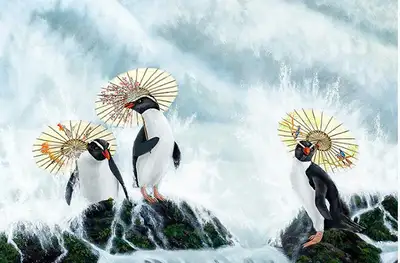
Art work by Andrea Robinson, titled 'Surf's Up' and featuring critically threatened Tawaki, or Fiordland crested penguins.
Seeing the beauty of nature as first step towards action
Mr Townsend says that many young people manage their emotions by switching off from the barrage of negative news coverage because they feel overwhelmed and powerless about the climate crisis and its impact, from biodiversity loss, marine pollution and mass species extinctions to name a few.
“We want to re-frame the conversation in a more positive light by showing [through the publication] this is what people are doing, this the beauty people see in the environment, this is the ideal we have and this is what governments around the world are doing – and what else can we do?”
The team, comprised of two internal and two distance students, came together as part of a project to produce a publication for a third-year course, with their shared vision to find a new way to address the massive threat of climate change. They want to empower others to share their perspectives and experiences in a creative way that can lead to further action, whether in the form or petitions, protests or political lobbying.
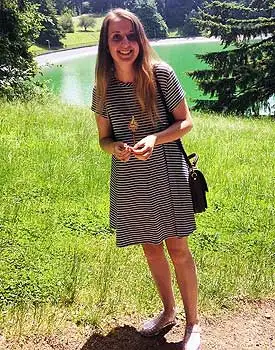
Publication team and Massey student Hannah Bennett.
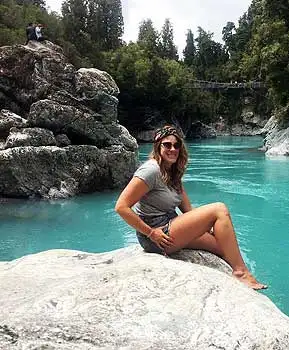
Publication team and Massey student Rachel Lewis.
The grace of trees
A nature-lover from Motueka and now studying at Massey’s Wellington campus, Mr Townsend grew up going on weekend bushwalks – somewhat unwillingly at first, he admits.
“My dad has been dedicated to conservation all his life working for DoC (Department of Conservation], so as kids we’d get taken most weekends walking in national parks. At first, I’d complain, but then I realised that the more time I spent immersed in the bio-diversity – trees, ferns and birds and being able to witness the slow rate of their growth as I’d come bombarding through – I was seeing how gracefully the forest always welcomes you back. It’s like the original niche.”
The first edition, launched last week, focuses on local community initiatives in New Zealand and beyond. Mr Townsend hopes this will spark a call for action by encouraging readers to link up with conservation groups in their neighbourhood. “There are so many groups doing amazing things around the country but they lack volunteers. The average age of volunteers in the Abel Tasman area is over 60.”
Mr Townsend will also contribute his own material – a video of a live poem about rivers and oceans, as well as written poems. Majoring in Expressive Arts and currently enrolled in a creative writing paper on advanced fiction, he says poetry and writing are his passions and the reason he is at Massey.
He and the team, which includes Hannah Bennett, Rachel Lewis and Liana Roberts-Letiu, intend to continue the publication beyond the duration of their course, and are keen to receive submissions for future editions. “We’re looking for content which reflects how we can positively relate to our environment, react to political and economic inaction and adapt towards our changing climate and growing knowledge,” he says.
“We want to know what people are doing around the world to improve their environment, and to help understand what is required to gain an earth-centred perspective and what hinders one. We want to help communicate the latest in environmental sciences and to drive literary works which motivate a higher connection with nature.
“We encourage storytellers from any medium to contribute – be it poetry, photography, podcasts, journalism, reports, short stories, creative nonfiction, film, comic strips and music.”
Send questions and submissions to submissions@theanthropozine.org
Read more: https://theanthropozine.org and follow on Facebook:
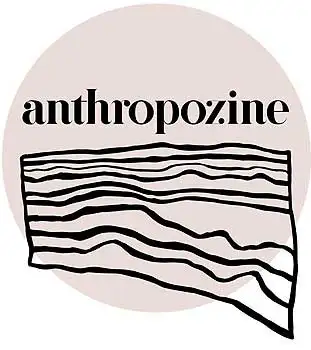
The Anthropozine logo.